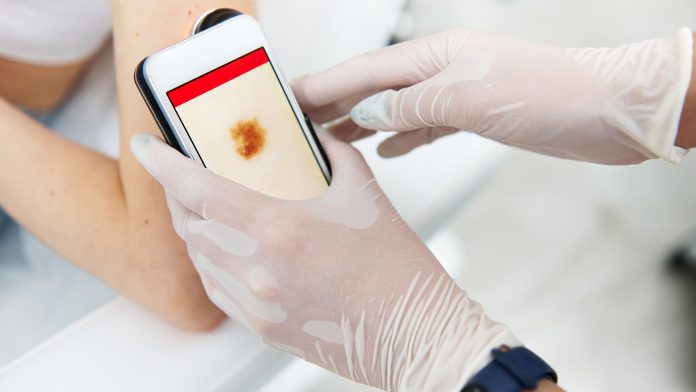A new study has found that AI skin cancer screening is as reliable as medical experts but not at recommending treatments.
The research, conducted by a collaborative team of Austrian and Australian researchers and led by renowned dermatologist Dr Harald Kittler from the Medical University of Vienna (MedUni Vienna), analysed the efficacy of Artificial Intelligence (AI) in skin cancer diagnosis and treatment recommendations for pigmented skin lesions.
The team compared the skin cancer screening and treatment accuracy of two distinct AI algorithms in smartphone applications against that of medical professionals. The findings suggest that AI holds great potential for diagnosis but falls short in treatment decisions.
The research team assessed the AI skin cancer screening in two prominent skin cancer centres, the University Department of Dermatology at MedUni Vienna and the Sydney Melanoma Diagnostic Centre in Australia.
The prospective study involved two scenarios, with AI employed in Scenario A for evaluating changes suggestive of skin cancer and in Scenario B for patients with numerous moles.
The AI-assisted applications were benchmarked against both seasoned medical experts and less experienced physicians.
AI skin cancer screening on par with experts
Two different AI-based smartphone applications were put to the test: a cutting-edge 7-class AI algorithm and the ISIC algorithm, which had been previously used in retrospective preliminary studies.
In Scenario A, the research team scrutinised 172 suspicious pigmented lesions, of which 84 were ultimately diagnosed as malignant, across 124 patients.
In Scenario B, the research team analysed 5,696 pigmented lesions, of which 18 were malignant, across 66 patients.
The 7-class AI algorithm demonstrated skin cancer screening accuracy equivalent to that of the experts, clearly outperforming the less experienced physicians.
Conversely, the ISIC algorithm performed somewhat worse compared to the experts but still better than its less seasoned counterparts.
AI treatment decisions fall behind experts
The researchers observed a significant discrepancy when it came to treatment decisions. The 7-class AI algorithm lagged behind the expertise of the dermatologists, but it still outperformed the less experienced physicians.
Dr Kittler explained: “The AI application tends to recommend the removal of more benign lesions than experts would. When considering its use, it’s crucial to bear in mind that uncritical utilisation could result in the need to clarify an excess of false-positive findings.”
The study sheds light on the remarkable capabilities of AI in skin cancer screening, with results suggesting that it can rival the expertise of seasoned dermatologists in real clinical scenarios.
This could have profound effects on accelerating diagnosis and improving health outcomes, with the World Health Organization stating that between two and three million non-melanoma and 132,000 melanoma skin cancers occur globally each year.
However, the gap between AI and human professionals becomes evident when it comes to treatment recommendations.
The findings emphasise the importance of utilising AI with caution, ensuring that it is complemented by the discernment of experienced medical practitioners to avoid unnecessary interventions for benign lesions.









